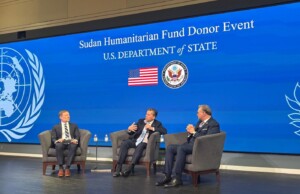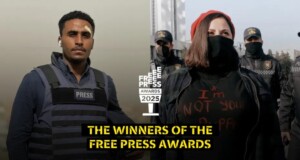Press freedom: Journalists continue working in repressive Sudan
The conditions the press face in Sudan remain “very difficult and harsh”, because journalists have to work under a repressive regime, a Sudanese network of journalists said on World Press Freedom Day.
 Journalist Mohamed El Amin Osheek in police cells in Sawakin (15 June 2017)
Journalist Mohamed El Amin Osheek in police cells in Sawakin (15 June 2017)
The conditions the press face in Sudan remain “very difficult and harsh”, because journalists have to work under a repressive regime, a Sudanese network of journalists said on World Press Freedom Day.
Ghana hosted this year’s World Press Freedom Day for the fourth time that the global celebration takes place on African soil since 1993. The event with the theme ‘Balance of Power: Media, Justice and the Rule of Law’ gathered about 800 investigative journalists, representatives of the media and the judiciary, and students of journalism.
Among the participants was the Sudanese Journalists Network for Human Rights (JAHR). General coordinator Faisal El Bagir said in an interview with Radio Dabanga that the event has been an important platform for the exchange of ideas and experiences.
Media Initiative
El Bagir announced the launch of the ‘Media Initiative for Africa and the Safety of Journalists’ in the framework of a strategic partnership between the initiative and JAHR. The initiative is concerned with the safety of journalists and help them performing their duties in Sudan’s political and legal atmosphere.
JAHR itself has built and strengthened the capabilities of hundreds of journalists in Sudan and South Sudan through various means.
Journalist Khalid Fathi, the editor of the independent daily newspaper of El Tayyar, told Radio Dabanga on the occasion of World Press Freedom Day that the Sudanese press suffers from multiple restrictions by the ruling authority. “These restrictions are imposed as part of legal duties and sometimes lead to an illegal act.”
‘The Sudanese authorities empty the press of its content with these obstacles to intimidate journalists.’ – Newspaper editor-in-chief Khalid Fathi
He pointed to the blocking of information to the press, and economic restrictions imposed through tax and customs institutions in order to affect the financial situation of newspapers.
“These difficulties and restrictions impede the press and journalists in Sudan, while at the same time they restrict the freedom of expression and opinion. The authorities empty the press of its content […] with these obstacles to intimidate journalists.”
Fathi stressed the events during the widespread protests in Sudan that followed the Parliament’s approval of the annual budget for 2018. Already soaring prices of the main consumer goods doubled or even tripled, and the US Dollar customs rate increased further, to the dismay of Sudanese people.
Journalists present at these demonstrations, including correspondents of Reuters and AFP, were detained and held in detention. Some for more than two months.
Last week, the Sudanese National Intelligence and Security Service (NISS) has forbidden newspapers in Sudan from publishing any material related to the fuel crisis that has impacted the entire country for several months.
UNESCO
The two-day event in Accra on May 2 3 was organised by the United Nations Educational, Scientific and Cultural Organization (UNESCO) in partnership with the Government of Ghana. Mr Getachew Engida, deputy director-general of UNESCO, stressed the need for women journalists to be empowered and protected from gender-based harassment, as well as the need for effective implementation of measures to keep journalists safe, measures to ensure freedom of speech online and the need for professional and investigative journalism to counter disinformation, rumour, hatred and stereotypes.
Related:
Fatwa: ‘Sudan’s campaign of newspaper confiscations haram’ (December 21, 2017)












 and then
and then